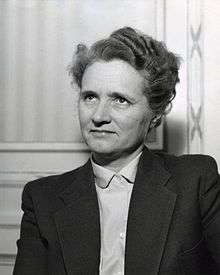Marga Klompé
| Marga Klompé | |
|---|---|
 Marga Klompé in 1956 | |
| Minister of Culture, Recreation, and Social Work | |
|
In office 22 November 1966 – 6 July 1971 | |
| Prime Minister | Piet de Jong |
| Preceded by | Maarten Vrolijk |
| Succeeded by | Piet Engels |
| Minister of Education, Arts, and Sciences (ad interim) | |
|
In office 23 April 1963 – June 1963 | |
|
In office 7 November 1961 – 4 February 1962 | |
| Prime Minister | Jelle Zijlstra |
| Preceded by | Jo Cals |
| Succeeded by | Jo Cals |
| Minister of Social Work | |
|
In office 13 October 1956 – 24 July 1963 | |
| Prime Minister | Jelle Zijlstra |
| Preceded by | Frans-Jozef van Thiel |
| Succeeded by | Jo Schouwenaar-Franssen |
| Personal details | |
| Born |
Margaretha Albertina Maria Klompé 16 August 1912 Arnhem, Netherlands |
| Died |
28 October 1986 (aged 74) The Hague, Netherlands |
| Political party | Catholic People's Party |
| Alma mater | Utrecht University |
Margaretha Albertina Maria 'Marga' Klompé (16 August 1912 – 28 October 1986) was a Dutch politician and member of the Catholic People's Party.
Klompé was member of the House of Representatives (1948–1956; 1959; 1963–1966; 1967), Minister of Social Work (1956–1963), interim Minister of Education, Arts, and Sciences (1961–1962; 1963), and Minister of Culture, Recreation, and Social Work (1966–1971). She was the first female government minister in the Netherlands in 1956. She was responsible for the Social Security Bill in 1963.[1]
Biography
Margaretha Albertina Maria Klompé was born on 16 August 1912 in Arnhem in the Netherlands into a Catholic family of five children. Her father was the Dutch J. P. M. Klompé, who owned a stationery shop and her mother was the German-born A. M. J. A. Verdang.
Klompé attended the Utrecht University where she studied chemistry from 1929 till 1937. During these years, and as a result of her studies, Klompé started to question several aspects of religion and in particular the institute itself. Following this crisis, Klompé's commitment to religion was reinforced which she combined with an open mind.
Klompé obtained a PhD in mathematics and physics (1941) and went on to teach chemistry and physics in the Mater Dei High School for girls between 1932 and 1949 in Nijmegen.
In 1942, Klompé also started to study medicine at the University of Utrecht, but when the Second World War broke out the university was closed. During the war years, Klompé was active in the Dutch underground resistance as a messenger.

After the war, Klompé started to focus on politics, which was rather unusual for a woman at the time. In 1948, she entered the House of Representatives and by 1956 she became the first female secretary of the Netherlands focusing on Social Affairs. Her main contribution was the passing of the Social Security Bill in 1963, which replaced the previous Poverty Bill.
Klompé was also a member of several national and international associations, such as the Council of Europe and the Joint Task Force for European Cooperation in Development.
In addition, Klompé was involved in the Catholic community. She was a member of the national council for the Bishops' Conference, member of the Papal Commission 'Justitia et Pax', and also founded the union of Roman Catholic female graduates.
Furthermore, Klompé supported the underprivileged in society. Therefore, her critics called her 'Our Lady of Perpetual Succour'.
Klompé died on 28 October 1986 in The Hague.
References
- ↑ (in Dutch) Dr. M.A.M. (Marga) Klompé, Parlement & Politiek. Retrieved on 7 March 2015.
External links
![]() Media related to Marga Klompé at Wikimedia Commons
Media related to Marga Klompé at Wikimedia Commons
| Political offices | ||
|---|---|---|
| Preceded by Frans-Jozef van Thiel |
Minister of Social Work 1956–1963 |
Succeeded by Jo Schouwenaar-Franssen |
| Preceded by Jo Cals |
Minister of Education, Arts, and Sciences (ad interim) 1961–1962 1963 |
Succeeded by Jo Cals |
| Preceded by Maarten Vrolijk |
Minister of Culture, Recreation, and Social Work 1966–1971 |
Succeeded by Piet Engels |